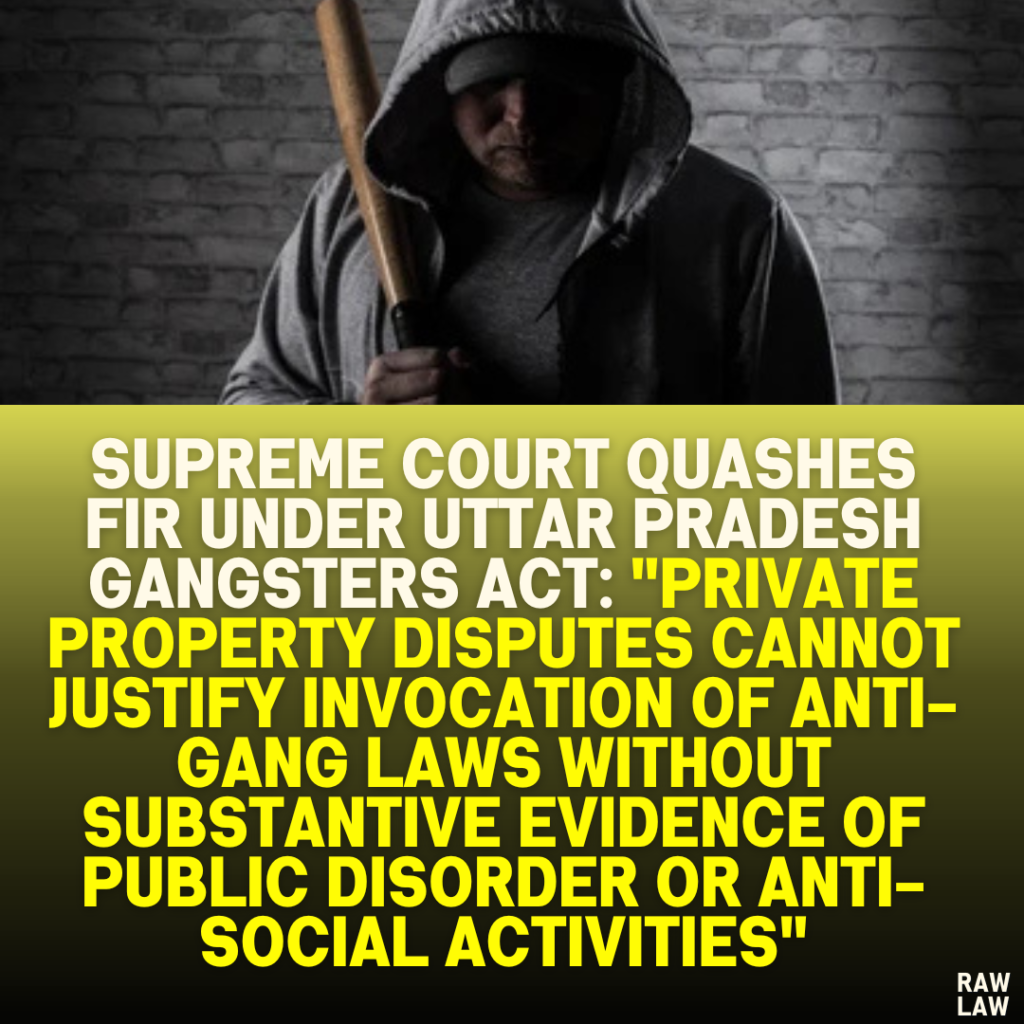Court’s Decision:
The Supreme Court quashed the FIR (Case Crime No. 0092/2023) under the Uttar Pradesh Gangsters Act, holding that the allegations in the FIR did not justify invoking the Act. It set aside the High Court’s order and ruled that the pending criminal and civil disputes related to the case should be adjudicated on their own merits. The Court made it clear that the invocation of the Act was premature and unwarranted in this instance.
Facts:
- Allegations Against the Appellants:
- The appellants were accused of being members of a gang involved in anti-social activities, including extortion and fraud.
- The FIR was based on three criminal cases:
- CC No. 119/2022: Allegations of dacoity and destruction of property.
- CC No. 58/2023: Dispute over an incomplete property sale agreement involving a significant advance payment.
- CC No. 60/2023: Allegations of fraud concerning an exchange deed for property.
- Nature of Disputes:
The appellants argued that these cases arose out of private property disputes, which were primarily civil in nature and should not be subject to criminal prosecution under the Gangsters Act. - High Court’s Decision:
The High Court dismissed the appellants’ writ petition to quash the FIR and advised them to seek bail, refusing to adjudicate the merits of their claims at that stage.
Issues:
- Whether disputes of a civil nature can be criminalized and prosecuted under the Gangsters Act.
- Whether the material on record justified invoking the provisions of the Gangsters Act against the appellants.
Petitioner’s Arguments:
- Misuse of the Act:
The appellants contended that the allegations in the FIR did not constitute anti-social activities as defined under Section 2(b) of the Act. They argued that private disputes over property and monetary transactions had been given a criminal color. - Civil Proceedings Already Pending:
The appellants pointed out that related civil suits were pending adjudication, and criminal prosecution was being used to pressure them unfairly. - Violation of Article 21:
They argued that invoking the Gangsters Act in such cases would violate their right to life and liberty under Article 21 of the Constitution.
Respondent’s Arguments:
- State’s Stand:
The State argued that the appellants were part of a criminal gang and engaged in activities like extortion and intimidation, creating public fear and disorder. They emphasized that the Gang Chart was prepared and approved by the Commissioner of Police, as required under the Act. - Nature of Allegations:
Respondent No. 5 argued that the allegations in the three criminal cases clearly disclosed cognizable offences and involved anti-social activities. They also highlighted that civil proceedings do not exempt the appellants from criminal liability. - Public Interest:
The State maintained that the invocation of the Act was necessary to curb the appellants’ activities and ensure public safety and order.
Analysis of the Law:
- Strict Interpretation of Penal Statutes:
The Court emphasized that penal statutes must be strictly interpreted, especially when they infringe on personal liberty. Vague or unsupported allegations cannot justify the application of stringent laws like the Gangsters Act. - “Lifting the Veil” Principle:
The Court adopted a principle of “lifting the veil,” meaning it examined the substance of the allegations rather than relying solely on their formal framing in the FIR. This approach ensures that the Act is not misused for ulterior motives. - Civil vs. Criminal Nature:
The Court noted that the disputes in this case were primarily civil in nature, related to property ownership and monetary transactions, and lacked the element of public disorder or intimidation required under Section 2(b) of the Act.
Precedent Analysis:
- Mohammad Wajid v. State of Uttar Pradesh (2023 SCC OnLine SC 951):
The Court held that FIRs must be scrutinized closely in cases involving potential misuse of criminal law to settle personal vendettas. - Md. Rahim Ali @ Abdur Rahim v. State of Assam (2024 SCC OnLine SC 1695):
Penal statutes must be strictly construed, and any deviation from their legislative intent should not be allowed.
Court’s Reasoning:
- Nature of Allegations:
The Court observed that the allegations in the FIR primarily related to private property disputes and monetary claims, which are civil in nature. It held that merely invoking sections of the IPC does not justify invoking the Gangsters Act without substantive evidence of anti-social activities. - Vagueness of the FIR:
The Court found the allegations in the FIR vague and insufficient to meet the threshold requirements of the Act. It stated, “The right to life and liberty guaranteed under Article 21 cannot be overlooked due to unsubstantiated allegations.” - Premature Invocation of the Act:
The Court noted that the criminal cases referred to in the FIR were still pending and that the allegations had not been proven. It emphasized that the Act should only be invoked in cases of serious criminal activity, not routine civil disputes.
Conclusion:
The Supreme Court quashed the FIR, ruling that the allegations did not meet the criteria for invoking the Gangsters Act. It held that the proceedings were premature and directed that the pending criminal and civil cases be adjudicated independently. The Court clarified that its observations in this judgment do not prejudice the merits of the ongoing cases.
Implications:
- Protection Against Misuse:
The judgment reinforces safeguards against the misuse of penal statutes, ensuring that laws like the Gangsters Act are not used to settle private disputes. - Balance Between Civil and Criminal Law:
The ruling draws a clear line between civil and criminal disputes, emphasizing that criminal law cannot be used as a tool for harassment in civil matters. - Guidelines for Authorities:
The judgment is likely to influence the application of the Gangsters Act in future cases, ensuring that its invocation aligns with its legislative intent and is based on substantive evidence.




Pingback: Karnataka High Court Reinstates Conviction in Cheque Dishonour Case: Affirms Presumption Under Section 139 of NI Act and Justifies Conviction for Failure to Rebut - Raw Law